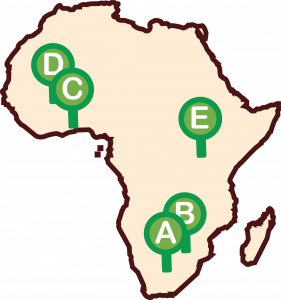H3Africa Collaborative Research Center
Africa Wits-INDEPTH Partnership for Genomic Research (AWI-Gen)
The Goal: AWI-Gen is working to understand how genes, environment, and lifestyle affect cardiovascular and metabolic health across Africa and to uncover new insights that could help to improve the health of Africans.
Project Leads
The Problem
Due to advances in the field of genetics and genomics, researchers now have the ability to understand how one’s DNA and their environment can play a role in their susceptibility to cardiometabolic disease, obesity, hypertension, and diabetes. However, currently most of our understanding of genetic influences on complex traits is gathered from Western populations. African populations have been routinely omitted from this fundamental research, keeping them from benefitting from public health strategies based on genomic knowledge.
Project Strategy
- Survey 12,000 participants across the continent for information regarding lifestyle, environment, and medical history.
- Collect blood and urine samples from participants to measure genomic and metabolic health factors.
- Use this information to explore genetic contributions and gene-by-environment interactions on susceptibility for traits like obesity, hypertension and diabetes.
- Use insights to support development of better prevention and treatment strategies and to inform public policy.
Outcomes & Impact
AWI-Gen researchers have found multiple associations between lifestyle factors, environmental factors, and genetic factors across many regions on the African continent. The group has replicated genetic associations and identified novel associations with lipid levels and carotid intima media thickness (a marker for atherosclerosis risk). They are examining the transferability of polygenic risk scores developed in European and multi-ethic cohorts in this African cohort, being mindful of regional and sex-specific differences across Africa. Their genetic data has shed a light on African population sub-structure and the need for appropriate adjustments in the design of trait association studies. AWI-Gen has increased the capacity for large epidemiological, genomic, and epigenomic studies to be conducted and analyzed in Africa. This group’s work, as well as their global collaborations, have expanded the extent to which African people and environmental contexts are considered in the broader research landscape.
Project Sites

A. South Africa
WITS Health Consortium, University of the Witwatersrand
B. South Africa
University of Limpopo
C. Ghana
Navrongo Health Research Center
D. Burkina Faso
Clinical Research Center of Nanoro
E. Kenya
African Population and Health Research Center
Non-African Collaborators
USA: Harvard University, Stanford University, University of Colorado
UK: University of Bristol, University of Leicester & Wellcome Trust Sanger Institute

